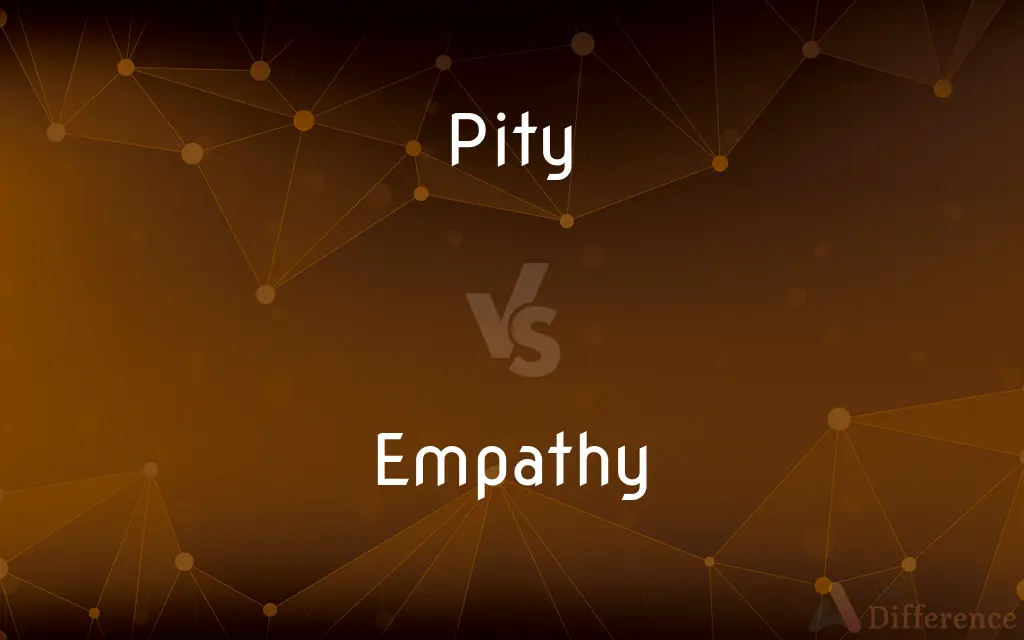Pity vs. Empathy — What's the Difference?
Edited by Tayyaba Rehman — By Fiza Rafique — Published on October 25, 2023
Pity is feeling sorrow for someone's misfortune, while empathy is understanding and sharing someone's feelings.

Difference Between Pity and Empathy
Table of Contents
ADVERTISEMENT
Key Differences
Pity implies a distant or detached feeling of compassion towards another person's misfortune or suffering. When someone pities another, they recognize the other's plight, but the emotion often places the one who pities in a position of superiority. Empathy, on the other hand, is the ability to place oneself in another's shoes, understanding their feelings and emotions on a deeper level. It bridges the gap between individuals, fostering a genuine connection.
While pity may sometimes involve looking down on someone or perceiving them as helpless, empathy emphasizes equality. Empathy doesn't see the other person as lesser; instead, it acknowledges their feelings, understanding that we all face challenges. Pity can often be a fleeting emotion, arising upon seeing or hearing about someone else's misfortune. Empathy, however, often involves a deeper connection and can lead to prolonged feelings of understanding and shared emotions.
Pity can sometimes be patronizing, possibly leading the one being pitied to feel weak, inferior, or undervalued. It's a passive emotion, acknowledging the pain but often without the intent to change or improve the situation. Empathy, in contrast, can be a driving force for change. When one feels empathetic, they don't just acknowledge the feelings of the other but may also be compelled to take actions to alleviate or share in their pain.
Comparison Chart
Nature
Feeling of sorrow
Understanding and sharing feelings
Position
Often superior stance
Equal stance, feeling with the person
ADVERTISEMENT
Duration
Can be fleeting
Often deeper and prolonged
Effect on Others
Can be patronizing
Promotes connection and understanding
Intent
Passive acknowledgment
May lead to actions to help or understand
Compare with Definitions
Pity
A feeling of sorrow for another's misfortune.
She felt pity for the stray dog in the rain.
Empathy
An emotional connection to someone's experiences.
Her empathy was evident when she cried during his story.
Pity
Compassion towards someone in distress.
His heart was filled with pity for the victims of the disaster.
Empathy
Recognizing emotions in others and relating to them.
He showed great empathy in comforting the grieving family.
Pity
A sense of sympathy and sorrow.
She had great pity for her friend's loss.
Empathy
Sharing in someone else's emotions or feelings.
Her empathy allowed her to connect with people from all walks of life.
Pity
A regrettable or unfortunate situation.
It's a pity she missed the concert.
Empathy
The ability to understand and share the feelings of another.
His empathy for her situation made her feel understood.
Pity
To feel sadness for someone's situation.
He pitied those who couldn't see the beauty in life.
Empathy
The ability to identify with or understand the perspective, experiences, or motivations of another individual and to comprehend and share another individual's emotional state.
Pity
Sympathy and sorrow aroused by the misfortune or suffering of another.
Empathy
The projection of one's own feelings or thoughts onto something else, such as an object in a work of art or a character in a novel or film.
Pity
A matter of regret
It's a pity she can't attend the reception.
Empathy
Identification with or understanding of the thoughts, feelings, or emotional state of another person.
She had a lot of empathy for her neighbor; she knew what it was like to lose a parent too.
Pity
To feel pity for or on account of
"No, he could not believe it a bad house.
Not such a house as a man was to be pitied for having" (Jane Austen). "An office worker pitied his confinement and slipped in to give him a loaf of bread" (Eric Scigliano).
Empathy
Capacity to understand another person's point of view or the result of such understanding.
Pity
To feel pity.
Empathy
A paranormal ability to psychically read another person's emotions.
Pity
(uncountable) A feeling of sympathy at the misfortune or suffering of someone or something.
I can't feel any pity towards the gang, who got injured while attempting to break into a flat.
Take pity on someone
Empathy
MDMA.
Pity
(countable) Something regrettable.
It's a pity you're feeling unwell because there's a party on tonight.
What a pity about the band breaking up. I loved them!
Empathy
Understanding and entering into another's feelings
Pity
(obsolete) Piety.
Empathy
A deep comprehension of another's state of mind.
With her empathy, she could sense when something was wrong.
Pity
(transitive) To feel pity for (someone or something).
You have got to pity the guy - he lost his wife, mother and job in the same month.
Pity
To make (someone) feel pity; to provoke the sympathy or compassion of.
Pity
Short form of what a pity.
Pity
Piety.
Pity
A feeling for the sufferings or distresses of another or others; sympathy with the grief or misery of another; compassion; fellow-feeling; commiseration.
He that hath pity upon the poor lendeth unto the Lord.
He . . . has no more pity in him than a dog.
Pity
A reason or cause of pity, grief, or regret; a thing to be regretted.
What pity is itThat we can die but once to serve our country!
Pity
To feel pity or compassion for; to have sympathy with; to compassionate; to commiserate; to have tender feelings toward (any one), awakened by a knowledge of suffering.
Like as a father pitieth his children, so the Lord pitieth them that fear him.
Pity
To move to pity; - used impersonally.
It pitieth them to see her in the dust.
Pity
To be compassionate; to show pity.
I will not pity, nor spare, nor have mercy.
Pity
A feeling of sympathy and sorrow for the misfortunes of others;
The blind are too often objects of pity
Pity
An unfortunate development;
It's a pity he couldn't do it
Pity
The humane quality of understanding the suffering of others and wanting to do something about it
Pity
Share the suffering of
Common Curiosities
Can someone feel both pity and empathy at the same time?
Yes, one can feel sorrow for someone's situation (pity) and also understand and share their feelings (empathy).
What is the primary difference between pity and empathy?
Pity is feeling sorrow for someone's misfortune, while empathy is understanding and sharing someone's feelings.
Can pity be seen as a negative emotion?
Pity can be perceived as patronizing or looking down on someone, while empathy is about connection and equality.
Does empathy always lead to action?
Not always, but empathy can be a driving force for change, motivating one to help or understand deeper.
Why is empathy considered deeper than pity?
Empathy involves placing oneself in another's shoes and genuinely understanding their feelings, whereas pity can be more distant.
Is pity always a negative thing?
Not necessarily, it's a natural emotion of compassion, but the way it's expressed can make it seem superior or distant.
Does empathy mean agreement with someone's feelings?
No, empathy is understanding and sharing feelings, not necessarily agreeing with them.
Can one be taught to feel pity or empathy?
While they're natural emotions, experiences and active efforts can increase one's capacity for both pity and empathy.
Are pity and sympathy the same?
They're similar but not identical. Pity focuses on sorrow for someone's misfortune, while sympathy is a broader understanding and support for someone's feelings.
Can empathy be exhausting?
Yes, constantly feeling and understanding others' emotions, known as empathy fatigue, can be draining.
How can one cultivate more empathy?
Listening actively, being present, and trying to see things from another's perspective can enhance empathy.
Is there a cultural difference in how pity and empathy are perceived?
Different cultures might value and express pity and empathy differently, affecting how they're perceived and practiced.
Which is more beneficial in helping professions, pity or empathy?
Empathy is generally more beneficial as it promotes understanding and connection, crucial in helping professions.
Is empathy always genuine?
Genuine empathy is sincere, but it's possible for someone to feign or mimic empathetic responses without truly feeling them.
Why might someone choose empathy over pity?
Empathy fosters connection and understanding, making relationships deeper and more authentic than the distance pity can create.
Share Your Discovery

Previous Comparison
Phase Velocity vs. Group Velocity
Next Comparison
B2B vs. C2CAuthor Spotlight
Written by
Fiza RafiqueFiza Rafique is a skilled content writer at AskDifference.com, where she meticulously refines and enhances written pieces. Drawing from her vast editorial expertise, Fiza ensures clarity, accuracy, and precision in every article. Passionate about language, she continually seeks to elevate the quality of content for readers worldwide.
Edited by
Tayyaba RehmanTayyaba Rehman is a distinguished writer, currently serving as a primary contributor to askdifference.com. As a researcher in semantics and etymology, Tayyaba's passion for the complexity of languages and their distinctions has found a perfect home on the platform. Tayyaba delves into the intricacies of language, distinguishing between commonly confused words and phrases, thereby providing clarity for readers worldwide.














































